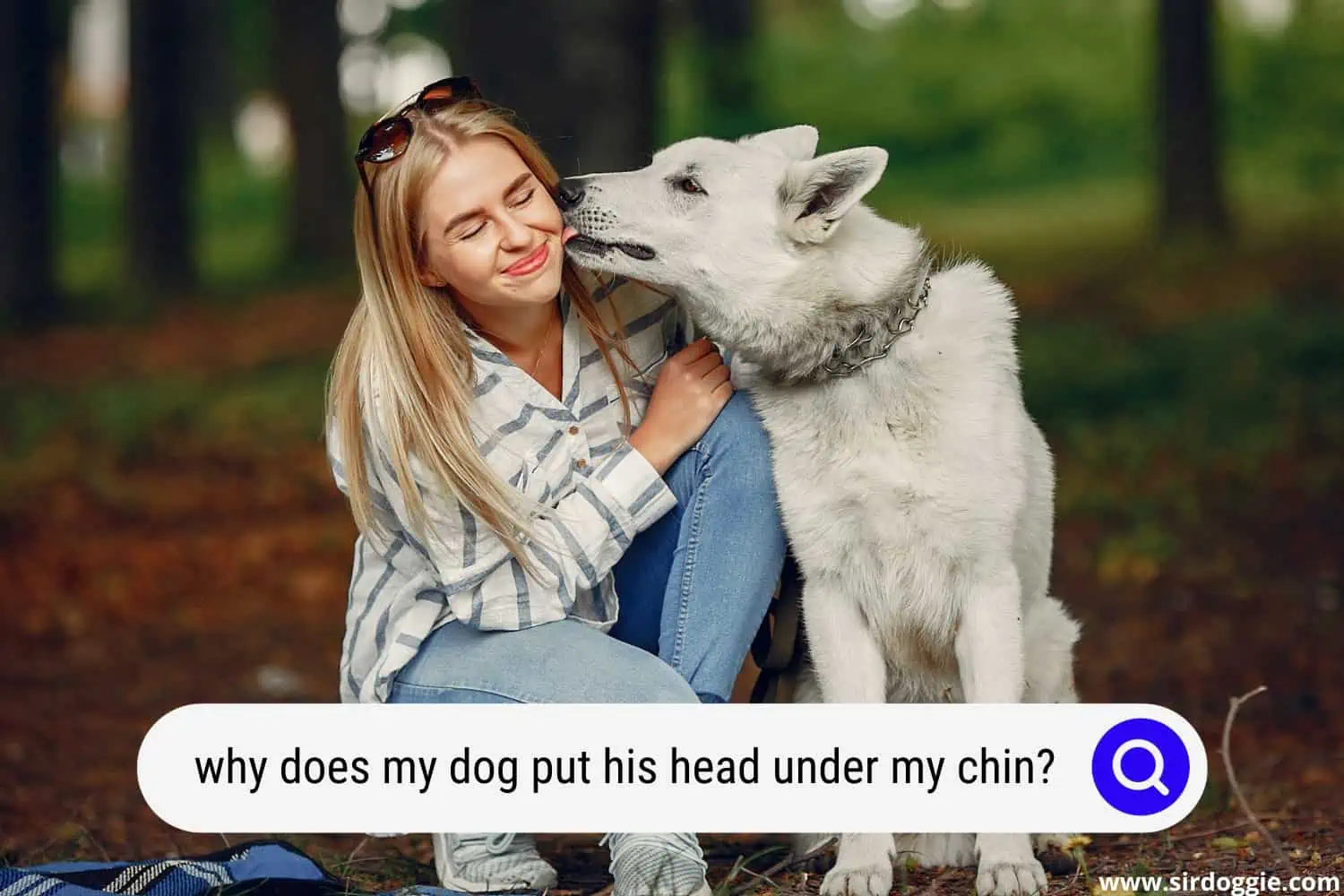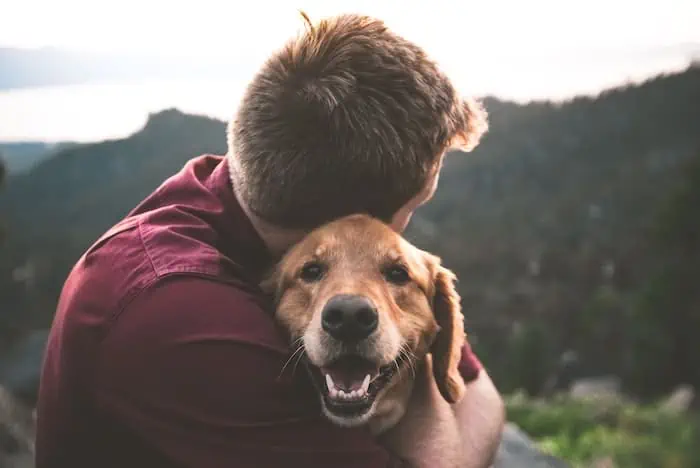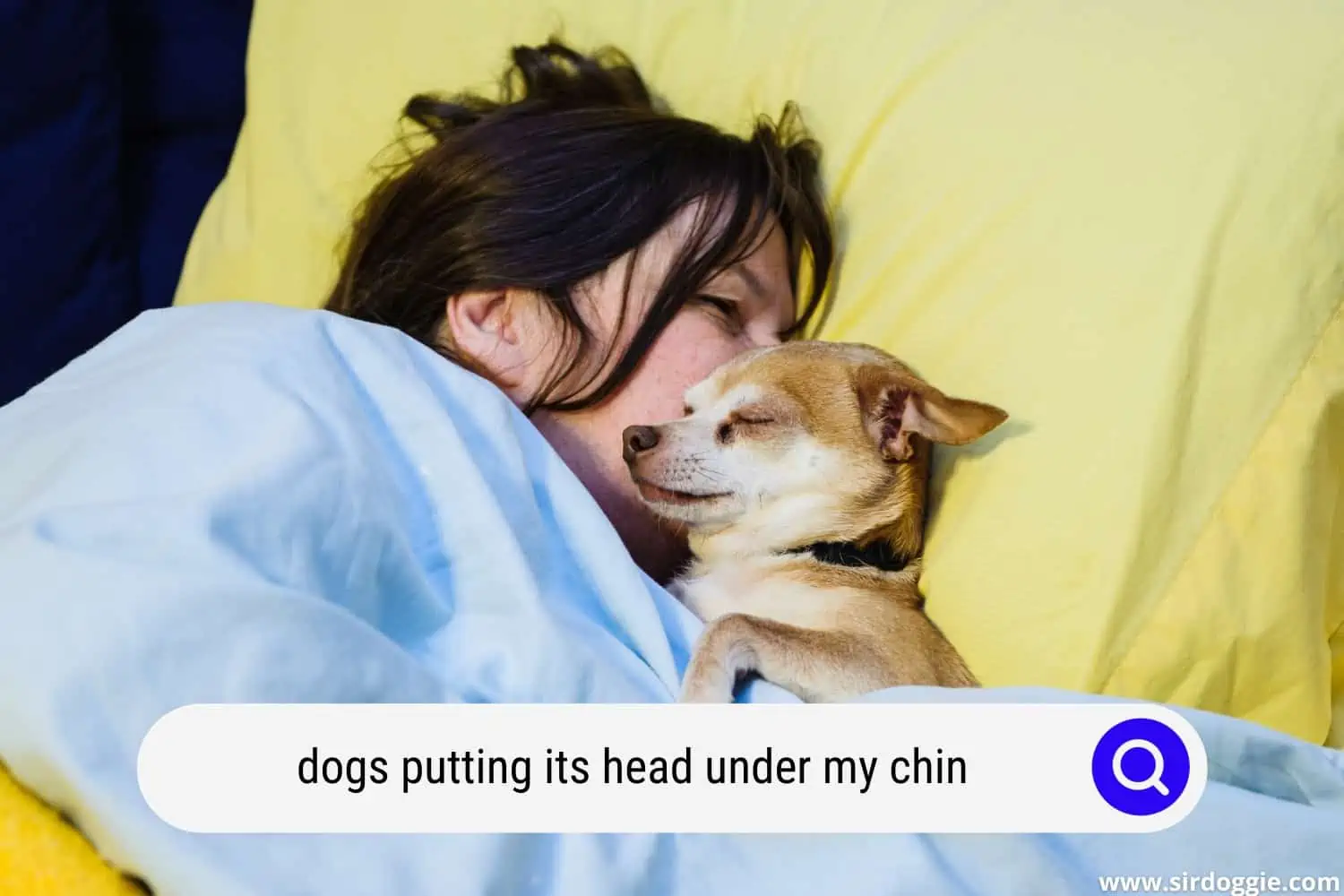Why Does My Dog Put His Head Under My Chin?
Since body language is the only way our dogs can communicate with us, they sometimes exhibit behaviors we humans find confusing. One of these behaviors that dogs frequently exhibit is putting their head under their owner’s chin. While this behavior seems odd to us, there is a message your dog is trying to communicate.

So, why does your dog put his head under your chin? Usually, this behavior is a sign of affection. Your dog is trying to communicate to you that he loves you and enjoys your company. You can show appreciation for your dog’s gesture by petting him in return. He’s showing you that he loves and respects you. Placing his head under your chin also indicates that your dog sees you as the boss and wants to show you he has good intentions.
Not all dogs place their heads under their owner’s chin, so if your dog doesn’t do this, it’s not an indication that he doesn’t love you. It just means he shows his love towards you in a different way. Some dogs, and some dog breeds, are naturally more cuddly than others.
Some canine behavior experts don’t see nuzzling behavior in dogs as a sign of affection but rather as a sign of submission. There’s some scientific evidence to support this theory. Understanding the motivation behind your dog’s behavior is key to choosing how you react to it. If your dog is showing submission, hugging him is not the right way to respond.
What is my dog saying when he puts his head under my chin?
Understanding and interpreting the message your dog is trying to send when he nuzzles under your chin is based on the context in which the behavior is exhibited. Take, for example, your dog’s behavior when he meets a stranger for the first time. He smells the person first. Then, as a general rule, he will either retreat, or he will rub his head against the person’s hand to indicate that he wants to be friendly.
When a dog interacts with its owner, the motivation is much different. Sometimes dogs nuzzle their owners to indicate “ownership.” By rubbing his head on your body, your dog leaves his scent behind. When other dogs smell you, they will know you “belong” to another dog.
Another possible explanation for chin-nuzzling behavior in dogs is that they are very sensitive to human emotions. Studies have shown that dogs can distinguish between happy conversation or singing and crying in humans. Meaning your dog knows when you’re sad. Most dogs will approach a crying human in a friendly manner. However, they are submissive when they do this. The catch is that dogs will approach any crying human, not just their owners, so it’s not a show of affection but a show of concern for negative emotions.
How should I react when my dog nuzzles me?
Regardless of the motivation for nuzzling, how you behave towards your dog is critically important. This reaction depends in part on the context, on the individual personality of the dog, and on how well you understand your dog. If your dog likes to be cuddled and hugged and has a positive reaction to you doing so, go ahead. But not all dogs like to be hugged, and dogs don’t think of hugs the same way humans do.

Dogs who have a tendency towards anxiety or reactivity should not be hugged or cuddled. Their nuzzling behavior most often comes from a desire to show submission. They want to tell you that they trust you to lead them, and they have good intentions towards you. A recent study at the University of British Columbia showed that 81.5% of dogs have body language that is anxious, stressed, and uncomfortable when they are being hugged.
If your dog is anxious while you’re hugging him, it can cause a cascade of negative consequences, including biting. Hugging can be intimidating for dogs, so settle for a non-threatening pet or a treat instead to express your love unless you absolutely know your dog enjoys it.
Other considerations for nuzzling behavior
We’ve established that nuzzling behavior is sometimes a show of affection and sometimes a show of submission. As with many other canine behaviors, the opposite can also be true. When a dog who is lower in status than another dog nudges, he is showing submission. When a dominant dog nudges another dog, he is showing dominance. If you have a dominant dog, he could be nuzzling you to tell you he is in charge.
Nuzzling to show dominance is often accompanied by other dominant behaviors, including barking, blocking your path of movement, or mounting. Your dog generally exhibits it to show that he wants something and will continue the behavior until he gets it. If you feel that your dog is exhibiting dominance nuzzling, you shouldn’t encourage the behavior but rather redirect it with some behavioral training.

Related Questions
Why does my dog rest his head on my lap?
Resting his head on your lap is another way your dog shows affection. It has nothing to do with dominance or submission. Your dog is trying to send the message that you are safe and he loves you.
Why does my dog bury his head into me?
This canine behavior is a little more complicated than some of the other ones. The most common reasons dogs bury their heads into their owners are to show affection, to mark their owners as “territory,” to get their owner’s attention, to seek safety or comfort, or simply that they’ve learned doing this gets them what they want.
One thing that is certain is that this isn’t a dominant behavior. If your dog is scared or anxious, like during a thunderstorm, this might be his way of feeling safe. If his water bowl is empty, he might dig his head into you to gain your attention and keep at it until you recognize he needs you to fill the water bowl. It’s also common for dogs to exhibit behaviors because they’ve learned the outcome is desirable. If you react to head burying by petting your dog or taking him for a walk, he will learn to exhibit the behavior to get the desired outcome.
Why does my dog put his head down when I pet him?
Many people assume this head ducking in dogs signals a past history of abuse, but this isn’t the case. The truth is that many dogs don’t like their head being touched, and this is the most common reason for head ducking. It doesn’t mean your dog doesn’t tolerate his head being touched. He might tolerate being bathed too without lashing out, but it doesn’t mean he enjoys it.
Try petting your dog in a different place, like his back or side—dogs like these areas being touched more than their head. Read your dog’s body language and pet him accordingly. Some dogs will angle themselves on your hand to show you where they want to be scratched. Others simply don’t want you touching their head. If your dog is head ducking, it’s an evasive maneuver, try petting him somewhere else, and the behavior may go away.

Family Dog Expert Author
Hi there! I’m Stuart, a devoted dog lover and family dog expert with over a decade of experience working with our furry companions. My passion for dogs drives me to share my knowledge and expertise, helping families build strong, loving bonds with their four-legged friends. When I’m not writing for SirDoggie, you’ll find me hiking, playing with my beautiful dog, or studying music.